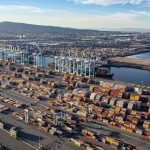Which fuel to choose for the future has become a big question and Lloyd’s Register has launched a new tool to support owners’ and operators’ decision-making as they assess different types of fuel for use by specific vessel types.
The classification society’s Maritime Decarbonisation Hub has unveiled ‘First movers in Shipping’s Decarbonisation – a framework for getting started’ and has used the tool to evaluate three fuel transition pathways applied to a container ship feeder fleet.
The framework focuses on the entire supply chain, from fuel production and supply to use on board ship. In this case, the feeder fleet was assumed to be operating between Singapore, Hong Kong and other Asian destinations nearby. The three fuels assessed in the evaluation process were methanol, ammonia and hydrogen. However, the framework can be applied to any fleet, using different fuels, to gain insight into different investment strategies.
The feeder ship analysis revealed a range of key findings. These included the fact that replacing older ships with new ones using zero-carbon fuels will not be sufficient to enable the industry to reach net-zero by 2050. Fuel efficient newbuildings and retrofits on existing ships will both be necessary. Meanwhile, since voyage costs dominated the total cost of the feeder fleet operation, a strong focus on vessel performance and voyage planning becomes increasingly important.
Fleet costs up to 2050 varied in each of the three fuel transition scenarios: in the chosen feeder fleet analysis, ammonia came out best, requiring total fleet costs of $44.5bn, followed by methanol – $51.5bn – and hydrogen – $69.4bn. These figures compared with a fossil fuel baseline of $42.3bn, including carbon cost.
Charles Haskell, Programme Manager of the LR Maritime Decarbonisation Hub, said: “Until now, research has either focused on a specific ship and fuel, or been too high-level and generic to have real relevance for shipping companies. Our ‘First movers in Shipping – a framework for getting started’ can support the container fleet in Asia by helping to reduce uncertainty and risk by providing an understanding of the transition pathways open to them.”
LR Decarbonisation consultant and lead author of the framework, Carlo Raucci, added: “The wider shipping industry can also benefit from the Maritime Decarbonisation Hub’s new report as it can form a framework for further studies that will unlock pathways for other fleets and vessel types in other regions. Risks can also be accurately evaluated, and mitigation plans can be put in place which in turn can support investment decisions today and more importantly, stimulate real action over words.”
Source: Seatrade Maritime News






